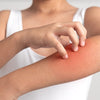The effect of stress on the skin and how to reduce it

Are you stressed? This could be the reason for your skin problems. Research has shown that stress negatively affects the condition of the skin and many skin conditions, such as psoriasis, dermatitis, acne, and hair loss.
Why does this happen?
→ Stress releases stress hormones like cortisol and adrenaline into the body. This leads to excessive sebum production, which can lead to clogged pores and acne breakouts.
→ Stress in response to “danger” (upcoming exams, pressure at work, arguments with a partner, etc.) activates the immune system, which causes inflammation in the body. This is a desirable response in the case of microbial infection or tissue injury, which helps the body protect itself. However, in the case of stress, the immune response overreacts, and inflammation triggers rashes and redness, making the skin more sensitive and slower to heal.
→ Stress also affects the balance of bacteria in the gut, which can lead to inflammation. Internal inflammation can manifest itself externally as skin conditions such as acne, dermatitis, rosacea, and psoriasis. It can also lead to the worsening of existing inflammatory skin conditions.
→ When we are stressed, nervous and anxious, we often unconsciously touch our face, thereby transferring bacteria to it, and by scratching and squeezing acne, we injure the skin and prolong the healing time.
But since we can't just run away from all the stress in life, we have to learn to deal with it properly.
10 ways to reduce the impact of stress on your skin
- CARE FOR YOUR SKIN
Despite being busy and lacking time, try to follow a daily skin care routine, at least the basics: cleansing, moisturizing , anti-aging , and applying SPF in the morning. Neglecting skin care can worsen its condition.

- EXERCISE
Exercise releases happy hormones and improves your well-being, energy, and appearance.
- RELAX
Take time for yourself and do things that make you happy and energize you. Read a book, pour yourself a bath, get a massage, listen to music...

- GO FOR A WALK
Take at least 15 minutes to go for a walk. Fresh air and walking have been shown to reduce stress and anxiety levels.
- PRACTICE STRESS REDUCTION TECHNIQUES
Practice stress-reduction techniques such as breathing exercises, yoga, meditation, and visualization.

- GET ENOUGH SLEEP
Your body rests and regenerates during sleep, so make sure you get at least 7 to 8 hours of sleep. A good night's sleep improves your mood and energy.

- HAVE HEALTHY MEALS
A healthy, balanced diet with whole foods, enough protein, and plenty of fresh fruits and vegetables improves the well-being and appearance of your skin, while processed foods and foods high in sugar increase inflammation in the body.

- DO NOT CONSUME ALCOHOL
In the long run, alcohol worsens stress and anxiety and causes poorer sleep.

- SET BOUNDARIES
Set priorities and learn to say no. By setting boundaries, you can reduce your stress levels and have more time in your day for the things that are truly important to you.

- ASK FOR HELP
If you feel overwhelmed, ask a friend for help or reach out to a professional therapist.

-
Posted in
Kako zmanjšati stres, Vpliv stresa na kožo




